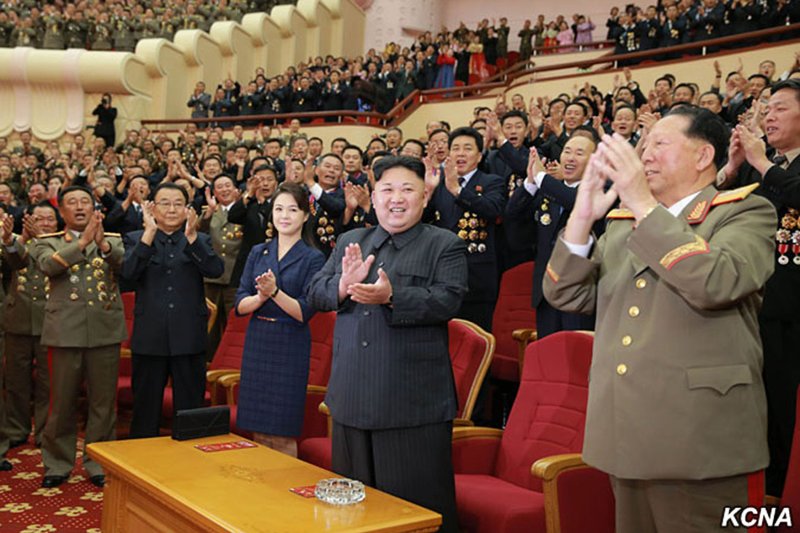North Korean leader Kim Jong Un, accompanied by his wife, Ri Sol-Ju, hosted a lavish gala at the People's Theatre in Pyongyang on Sunday. A economic review from a bank in Kuwait says geopolitical tensions are contributing to a rise in crude oil prices. Photo by KCNA/UPI |
License Photo
Sept. 12 (UPI) -- Geopolitical tensions, concerns about U.S. policy reform viability and the decline in the U.S. dollar have helped stimulate oil prices, a Kuwaiti bank said.
"The global economy continues to hum along, though political headwinds and weather conditions have complicated matters in recent weeks," a report published Tuesday by the National Bank of Kuwait read. "While the major economies have either maintained robust growth or seen some improvement, the North Korea crisis and severe weather conditions in the United States have weighed on markets."
Ratings agencies are weighing the impact of Hurricanes Harvey and Irma, two major storms systems that hit the southern United States and Caribbean islands over consecutive weeks. Mark Zandi, the chief economist at Moody's Analytics, said the U.S. economy could suffer lost revenue from the storms and the estimate for third-quarter gross domestic product could drop a half point to 2.5 percent as a result.
"It's hard to know at this point, but Harvey and Irma have likely caused a combined $150 billion to $200 billion in damage to Texas and Florida," Zandi said in a statement Monday.
Meanwhile, U.S. President Donald Trump said North Korea would regret escalating recent nuclear tensions, but added that a military option wasn't inevitable. The U.N. Security Council this week passed new sanctions on North Korea in response to recent missile activity, though the measure was less strict that the Trump administration had wanted.
The Kuwaiti bank said geopolitical tensions and concerns about whether or not the Trump administration could enact any of the reforms and initiatives he pledged on the campaign trail would materialize. So far, the new president has yet to score any major legislative victories. The U.S. dollar, meanwhile, has declined steadily, something the head of Russian oil major Rosneft said recently was contributing to the rise in crude oil prices.
When the value of the greenback falls, commodity prices increase because more dollars are required to purchase the same quantity as when the value was higher.
At around $54 per barrel, the price for Brent crude oil, the global benchmark, is up nearly $7 per barrel from June 30, but still below its peak of just over $56 per barrel for the year. The price for oil in recent weeks is inflated because of the market strains from Hurricanes Harvey and Irma.
"The price recovery has remained relatively limited, largely due to resilient shale oil production in the U.S. and high crude oil stocks," the Kuwaiti bank added.















